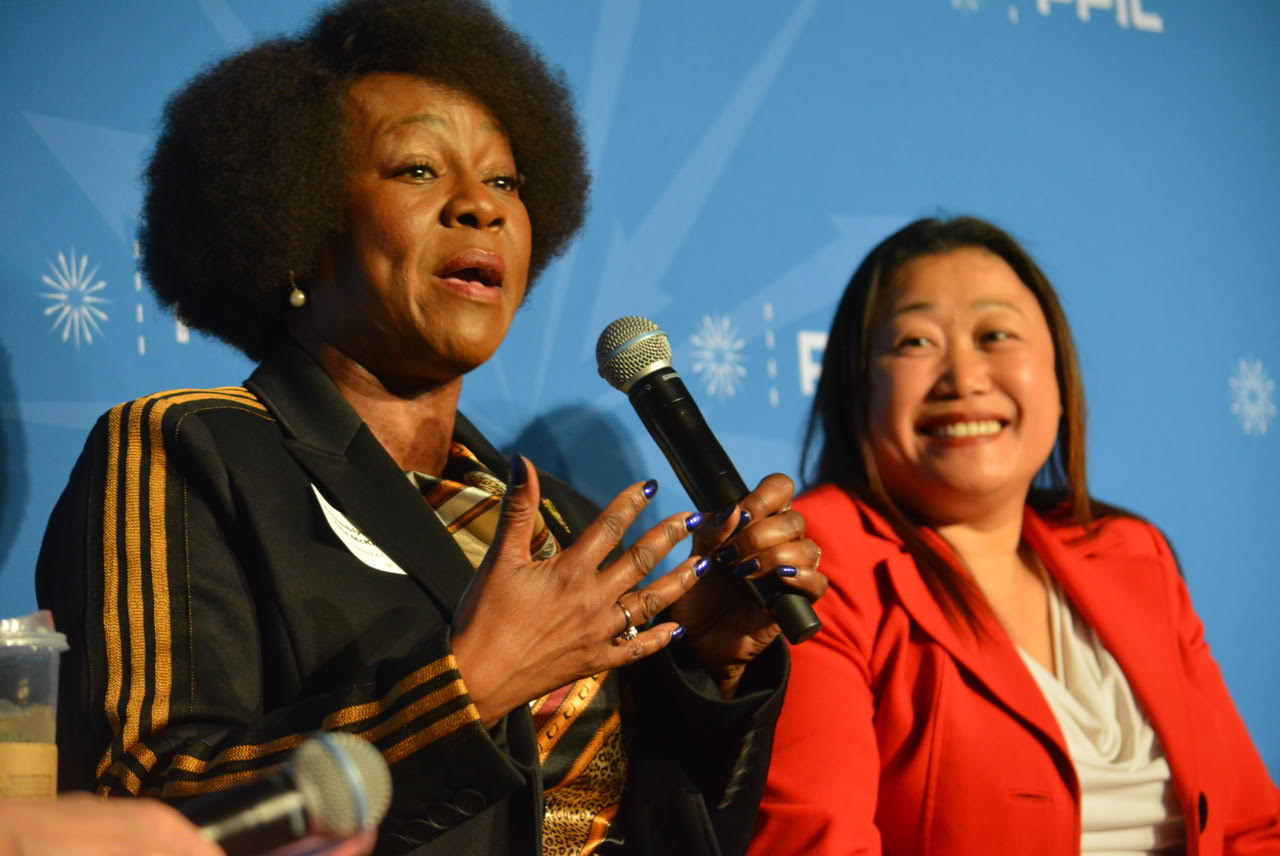Assemblymember Tina McKinnor (D-Inglewood) speaks at the Women in California’s Legislature event in Sacramento on March 8. The Women’s History Month event was hosted by the Public Policy Institute of California.CBM photo by Antonio Ray Harvey.
Antonio Ray Harvey | California Black Media
Last week, Assemblymember Tina McKinnor (D-Inglewood) joined a diverse panel of women legislators at the “Women in California’s Legislature: 2023 Speaker Series on California’s Future” luncheon to discuss the essential roles they play in shaping governmental policies benefiting Californians.
The event was hosted by the Public Policy Institute of California (PPIC) at the Sheraton Grand Hotel in Sacramento.
This year’s class of legislators includes the largest number of women in state history– 18 senators and 32 assemblymembers. Joining McKinnor on the panel by were state Senators Janet Nguyen (R-Garden Grove) and Nancy Skinner (D-Berkeley), and Assemblymember Liz Ortega (D-San Leandro).
McKinnor said she made the decision to get into politics after seeing the video of police officers beating motorist Rodney King in Los Angeles in 1992.
Over the years, Mckinnor said, a major influence on her policy decisions are the learnings she gleans from raising a family.
“I think (women) bring diversity to the table because we are about taking care of our families,” McKinnor said. “So, the legislation that you see coming out of this (panel), I
believe, will be around housing, jobs, equity, and public safety. The women here are going to make a tremendous difference because we take care of our families differently.”
Before McKinnor was elected to the California State Assembly in June 2022, she served as civic engagement director for the non-profit LA Voice and previously served as operational director for the California Democratic Party and chief of staff to several members of the State Assembly. She received a Bachelor of Arts degree in accounting from California State University Dominguez Hills.
McKinnor is currently chair of the Public Employment and Retirement Committee. She serves on other policy committees, including the Business and Professions Committee, Environmental Safety and Toxic Materials Committee, and the Governmental Organization Committee.
McKinnor’s legislative priorities include California’s continued COVID-19 recovery, increased funding for public education, expanded universal access to healthcare, the state’s housing and homelessness crisis, and reforming the state’s criminal justice system.
“I never thought I’d be in politics in 1992. I thought I had better get off the sofa and pay attention to what’s going on,” McKinnor said. “After that, I didn’t sit down, and I got involved in the community.”
Black women are 7.7% of the total U.S. population and 15.3% of the total number of women in the country, according to the U.S. Census.
In 2021 study, the State Innovation Exchange (SIE) – a group that advocates for representation in state legislatures — and the National Organization for Black Elected Legislative Women (NOBEL Women) took a deep dive into their analysis of women serving in government.
SIE and NOBEL Women reported that Black women fill just 4.82% (356) of 7,383 state legislature seats across the United States. That same year, eight state legislatures convened without a single Black woman in their ranks: Vermont, South Dakota, Hawaii, Arizona, Idaho, Nebraska, Montana, and North Dakota – all places with Black populations falling in a range from 2 to 6%, the study revealed.
Currently, there are five Black women in the California Legislature: McKinnor and Assemblymembers Lori D. Wilson (D-Suisun City), Mia Bonta (D-Alameda), Akilah Weber (D-La Mesa) and Sen. Lola Smallwood Cuevas (D-Ladera Heights). They are also members of the California Legislature Black Caucus.
Smallwoold-Cuevas is the lone Black woman among 40 state senators.
“I am the 20th Black woman to be elected to the (California) legislature,” McKinnor said at the event held on International Women’s Day. “Sen. Lola Smallwood
became the 21st Black woman. So, we still have a lot of work to do.”
PPIC, the nonprofit that organized the event, bills itself as nonpartisan think tank with a mission to inform and improve public policy in California through independent, objective, nonpartisan research. Former California Supreme Court Chief Justice Tani Cantil-Sakauye is PPIC’s president and chief executive officer.
Ophelia Basgal, an affiliate at the Terner Center for Housing Innovation at University of California, Berkeley, and a senior executive consultant for Inclusion INC, provided the opening remarks.
All the women legislators who participated in the event are members of the California Legislative Women’s Caucus, a political body that represents and advocates on the behalf of the diverse interests of women, children and families.
The panelists discussed gender diversity in state politics, how personal interests play out in politics, legislation they are currently working on, setting better policy for the state, and offered advice to women who are interested in running for office.
“In addition to the vision and experience, we bring that voice into the room that is often unheard and unseen,” said Ortega, a longtime labor leader and activist from an immigrant family. “We will make sure we are seen and heard and deliver (policies) for all in the state of California and the United States.”
The Sheraton Ballroom in downtown Sacramento was filled with women and men listening to the 60-minute conversation between the women that was at times passionate, thought-provoking, reflective and lighthearted.
“We’ve been truly inspired by this distinguished panel for their questions, insight, and answers,” Cantil-Sakauye said to the audience. “Thank you for making this (speakers series) memorable.”
The Inland Valley News coverage of local news in Los Angeles and San Bernardino counties is supported by the Ethnic Media Sustainability Initiative, a program created by California Black Media and Ethnic Media Services to support minority-owned-and-operated community newspapers across California.







